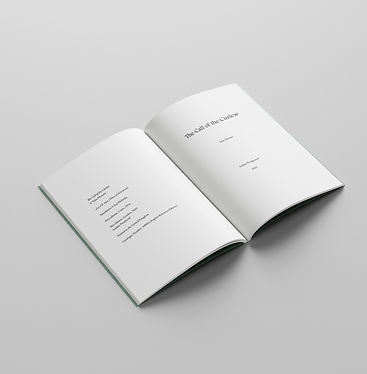
The Call of the Curlew
Taha Hussein
To republish The Call of the Curlew in a new English translation is not merely to revisit a classic text – it is to reclaim a voice that has too often been misheard, misrendered, or muted altogether. Taha Hussein, the blind Egyptian intellectual once hailed as the Dean of Arabic Literature, remains an essential figure in the history of modern Arab letters. And yet, this novel – among his most intimate and structurally daring – has long lingered in translation limbo, its literary brilliance dimmed by stilted prose, editorial neglect and a general underestimation of its quiet power.
The new translation of this work seeks to redress that silence – not by reinventing the book, but by listening to it more carefully. This is a novel that deserves clarity, nuance, and rhythm in English, not only because of its literary quality, but because of what it reveals: a modernist sensibility shaped in rural Egypt, a feminist intuition articulated by a man often seen as a patriarch of reform, and a profoundly unsettling narrative about class, gender, and agency in a society perched between tradition and transformation.
Told through the voice of Amna – also known as Soad – a servant girl turned reluctant wife, the novel unfolds with deceptive gentleness. A murder in the opening pages establishes the stakes, but the story that follows is not one of sensationalism or vengeance. It is one of survival: of memory, of what it means to speak – and to rewrite – one’s own story.
The structure of The Call of the Curlew is part of its radicalism. Shifting between first and third person, past and present, the novel mimics the fragmented nature of trauma and self-reflection. Amna sometimes narrates her own story, and at other moments, she retreats from it, allowing the third person to offer the distance she cannot. This recursive, layered approach has often baffled readers unfamiliar with Hussein’s formal experimentation. But it is precisely this narrative technique that makes the novel feel contemporary – uncomfortably so.


And what of the curlew? The bird whose call is both title and metaphor? In classical Arabic poetry, the curlew was a harbinger of longing, a bird whose wail stirred memories of exile, love, and loss. In this novel, its cry becomes something else: not just lament, but signal. Not a call to return, but a call to reckon – with history, with selfhood, with language. This retranslation is an invitation to answer that call: to read Amna’s story not as an artifact, but as a living, urgent piece of literature; to place The Call of the Curlew not just on a syllabus or a shelf, but within the ongoing conversation about literature’s role in representing – and resisting – the world as it is. In bringing this novel back into English, in restoring its voice and sharpening its contours, we do more than honour a canonical figure. We make space for the intimate revolution at the heart of Taha Hussein’s work: the revolution of storytelling itself.


In 2025, the story resonates in new and urgent ways. Amid global reckonings with gender violence, inherited trauma, and the limits of class mobility, The Call of the Curlew offers a portrayal of womanhood that is neither sentimental nor symbolic. Amna is not a heroine. She is jealous, resilient, greedy, perceptive, occasionally cruel. She is real. In her, Hussein constructs a subject who is not flattened into virtue or victimhood, but allowed the full range of her contradictions.
This insistence on interiority – especially for a poor, rural woman in early 20th-century Egypt – was radical in Hussein’s time. It remains radical now. In a literary landscape where Arab women are still too often exoticised, universalised, or politicised beyond recognition, Amna's voice cuts through as something different: grounded, embodied, and emotionally volatile. She speaks not for a cause, but from a life.
The notion of retranslating The Call of the Curlew now also speaks to the evolving landscape of world literature. We are moving – slowly – beyond tokenism and toward genuine engagement with the forms, voices, and aesthetics of the Global South. But such engagement demands care. It demands better translations. It demands acknowledgement of not only the literary value of these works, but the reasons they have been misread or sidelined in the first place.
It is easy to forget that Taha Hussein – this pillar of Egyptian intellectual history – was once a literary insurgent. His early writings were censored, his scholarship deemed heretical. He questioned the very foundations of Arab historiography. And in his fiction, he continued that project: interrogating received narratives, dismantling heroic myths, and foregrounding the fragile human truths buried beneath the architecture of ideology.
The Call of the Curlew does not present itself as a political novel. But make no mistake – it is a political intervention. Not in slogans or manifestos, but in its portrayal of a woman navigating a world not built for her; in its refusal to provide narrative closure; in its challenge to linear progress; in its depiction of survival not as triumph, but as compromise. To read this novel in 2025 is to hear echoes of our own moment: a time when old hierarchies crumble without guaranteeing liberation; when voice is valorised but not always heard; when the personal remains, inescapably, political.
November 2025
Japanese Hand-Sewn Paperback
148.5 x 210 mm – 130pp
+ Insert – 105 x 148.5mm – 8pp
